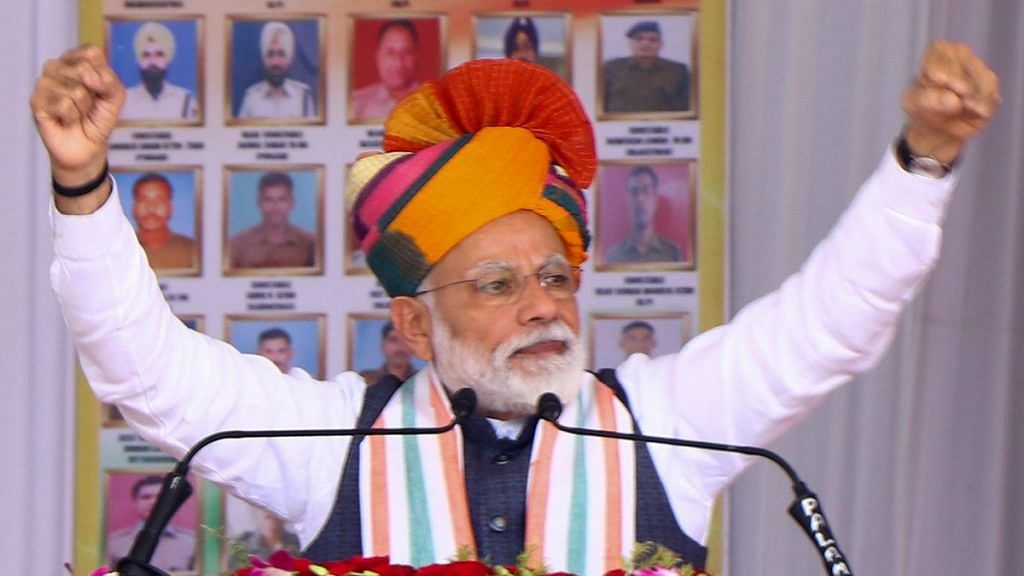Sarhadon par bahut tanaav hai kya,
Kuch pata toh karo chunav hai kya.”
Dr Rahat Indori, poet
At a recent Delhi University event that I participated in, a young student whose grandfather was a PoW in Pakistan for a year expressed anguish at BJP leaders donning Army fatigues. “They haven’t earned that,” said the student. As the clouds of war seamlessly flow into the election campaign, there are strong reasons to re-visit the provisions of the Representation of People Act 1951 and the Model Code of Conduct in national interest.
Seeking political gain from the bravery and sacrifices of the armed forces is vulgar and dangerous. Using photos of recent war heroes in election advertisements, reference to recent Army operations, bold hyphenated claims of casualties of the enemy and politicians wearing the uniform of the armed forces must all be banned in the election season.
A soldier’s operations do not belong in election rallies.
Scholar Julian Zelizer wrote about the inevitable influence of domestic politics on national security. Churchill warned his colleagues in parliament during WWII of such churlishness with his famous remark: “The nation will find it very hard to look up to leaders who are detected in that somewhat ungainly posture”.
Also read: Opposition leaders condemn Modi govt for politicising current situation with Pakistan
Exploiting terror
Matters of state security need to be delinked from election cycles.
Make no mistake, each party should have a national security doctrine. The citizens of India deserve to know what each party’s blueprint is. But that is the domain of election manifestos and position papers. The people of India do not deserve to be subjected to naked and desperate attempts to “war-rise” an election.
It took no time for some leaders to cash in on the whole Pulwama-Balakot episode. They even put pictures of the killed soldiers behind them on stage during political rallies.
That is where the law can come to rescue.
Representation of People 1951 Act (RPA)
The Act provides the rules of engagement for the conduct of state and general elections in India. It was brought into being by Babasaheb Ambedkar via Article 327 of the Constitution. Section 123 of the Act defines “corrupt practices”. Section 125 hand deals with “electoral offences”.
It is in these sections that I propose an expansion. Any “appeal” to incite or influence the voters by a candidate (or her/his agent) by alluding/referring to “recent security operations” should be prohibited and penalised. The penalty can be the usual class of penalties as envisaged in the Act (including disqualification). It is to my mind a “reasonable restriction” on free speech as envisaged in Article 19 (2) of our Constitution.
A reasonable window of time (say, last 24 months) could define “recent”. Similarly, discussion and consensus are needed to decide what can be deemed as a “security operation” (past and on-going) for this purpose. All forms of “appeal” (verbal, visual, etc.) should be included. As with all regulations, an effective mechanism would have to be created to ensure proper implementation and adherence on the ground level.
Governments come and go but India’s national security apparatus has to have institutional continuity, irrespective of all the sound and fury of campaign rallies. Nobody should be allowed to “milk” a national security crisis — not even the highest elected official in the land, even if there are practical implementation challenges.
Also read: Opposition justified in seeking Balakot evidence or shouldn’t politicise national security?
Election Commission’s Model Code of Conduct (MCC)
The MCC finds legal sanctity via provisions of the RPA 1951 and the IPC. The March 2019 MCC talks about ‘DOs & DONTs’ in Chapter 4.4. Chapter 2.3 talks about ‘corrupt practices’ and ‘electoral offences’. As with the RPA, it is time the meaning of these terms ought to be expanded.
Nothing forces people to take sides like conflict as George Orwell wrote in his 1940 essay: “My Country Right or Left”. Governments across the world have a history of lying and concealing facts during times of conflict. While we need to question the role of the media, we need to also question our elected leaders. One does not engage in conflict for the gallery. Politicians should not look at it with one eye on national interest and another on re-election.
Also read: BJP’s Manoj Tiwari is a cardboard warrior trying hard to prove he too has a 56-inch chest
Hosh not josh
We shall remain forever indebted to our brave hero Wing Commander Abhinandan Varthaman. As the nation rejoices his safe return, it is time for introspection on the intelligence failures that led to the attacks on our CRPF convoy in Pulwama. We need a renewed strategy against the Pakistani GHQ (deep state).
India’s patience with Pakistan has been exhausted, as has our patience with those looking to exploit the difficult situation for jingoism.
While we protect our borders and soldiers, we must also safeguard our voters and their autonomy. The act of voting is a deeply psychological and emotional one. All attempts at manipulating the voter must be curtailed and frowned upon.
The wounds of Pulwama may still be raw but work is already underway to cash in on it at the booth.
There is a thin line between patriots and propagandists. This is election season in India. Some will be trying to measure the “josh” of the nation. Someone needs to keep the nation’s “hosh” intact.
The author is a trained lawyer and spokesperson, the Congress. Views are personal. He tweets @vinayakdalmia.
